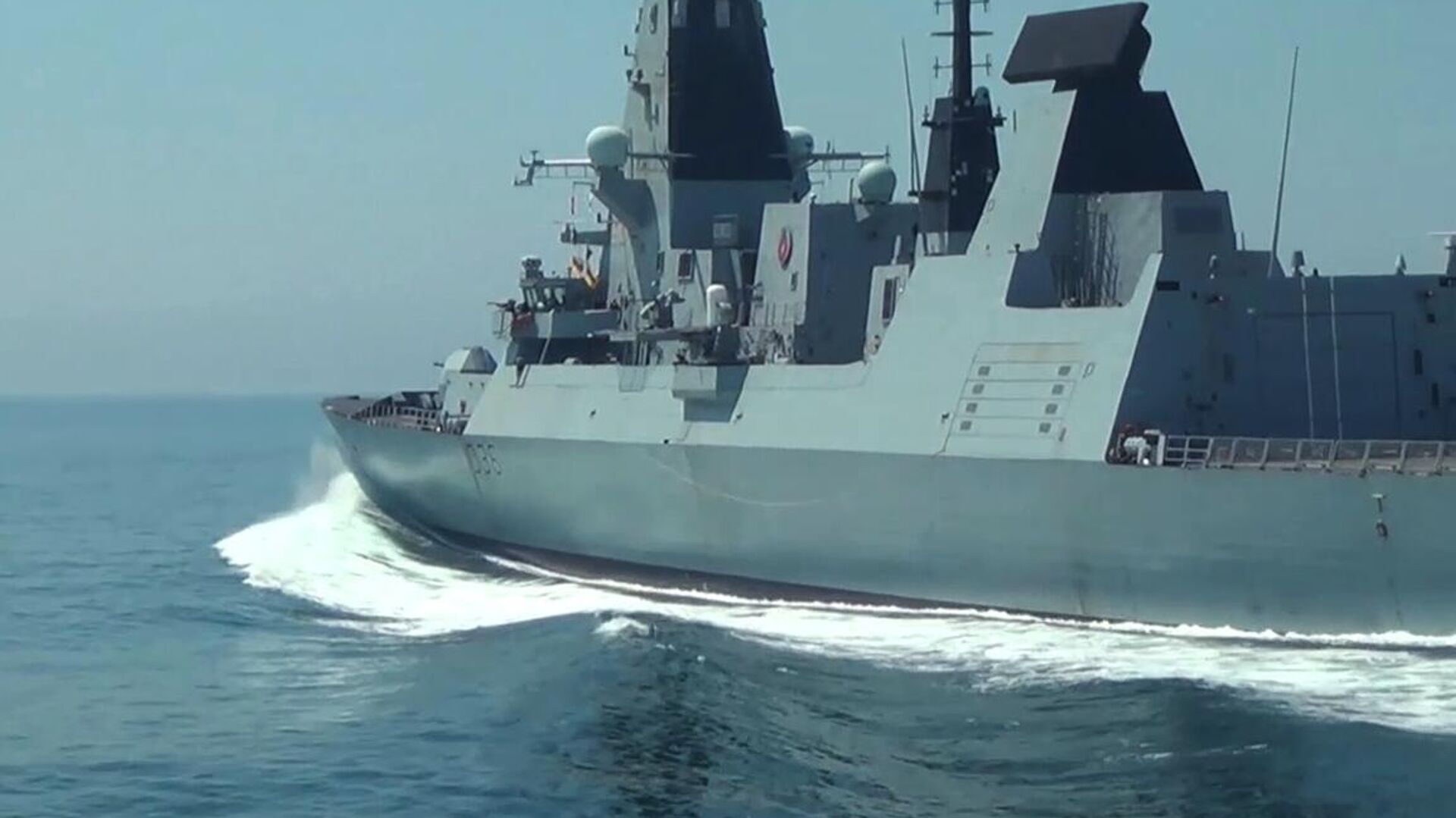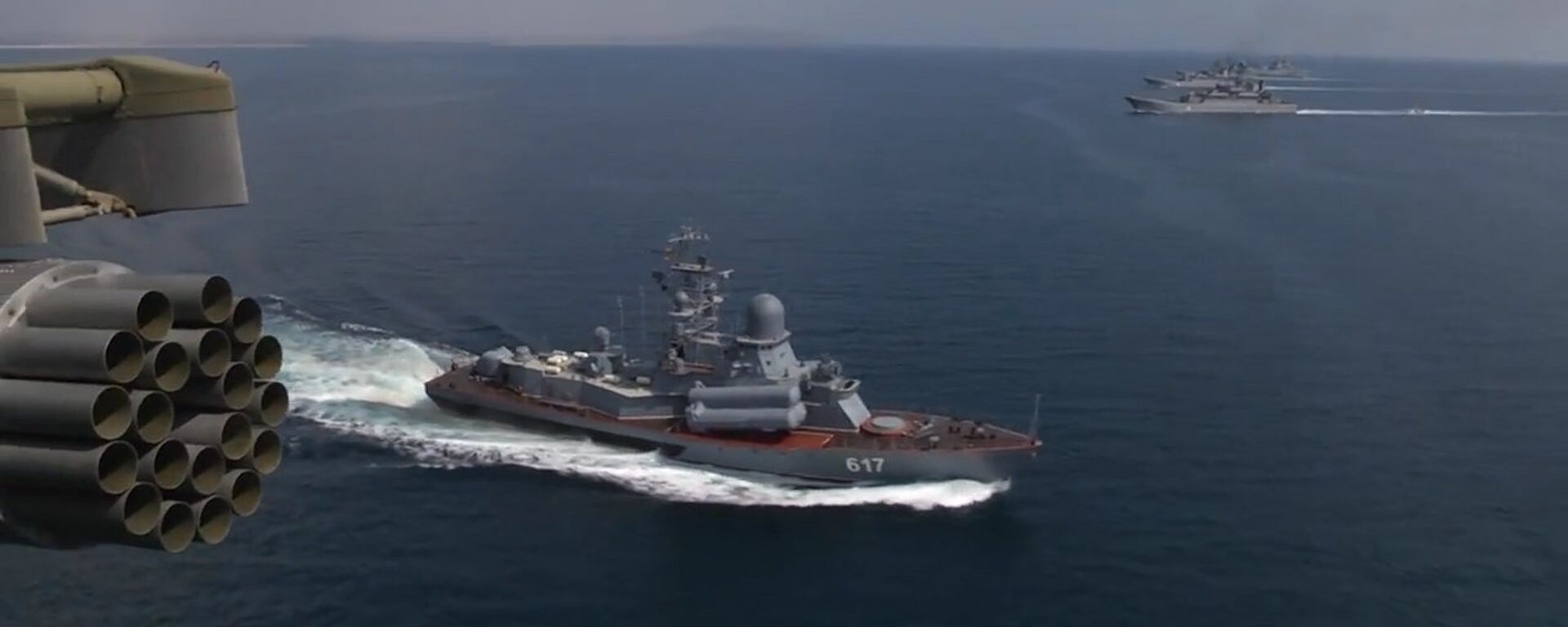https://sputnikglobe.com/20231001/uk-mulls-sending-its-navy-to-black-sea-and-military-instructors-to-ukraine-1113834425.html
UK Mulls Sending Its Navy to Black Sea and Military Instructors to Ukraine
UK Mulls Sending Its Navy to Black Sea and Military Instructors to Ukraine
Sputnik International
Britain delivered a whopping $2.8 billion dollars in military aid to Ukraine last year, with Downing Street pledging to do the same in 2023.
2023-10-01T06:27+0000
2023-10-01T06:27+0000
2023-10-01T06:37+0000
world
united kingdom (uk)
ukraine
russia
warships
black sea
support
black sea grain deal
training
https://cdn1.img.sputnikglobe.com/img/07e7/0a/01/1113835258_0:10:1154:659_1920x0_80_0_0_26f60d111ff39a18b6d6909e90c81cd3.jpg
The UK considers sending its naval ships to the Black Sea in a show of support for Ukraine, Defense Minister Grant Shapps has hinted in an interview with a British newspaper.He revealed that during his recent visit to Kiev, he discussed the issue with Ukrainian President Volodymyr Zelensky.Separately, he made it clear that Britain mulls the possibility of deploying its military in Ukraine to train the Ukrainian armed forces.The newspaper noted in this regard that the above-mentioned moves “would mark a significant escalation in the UK’s involvement” in the Ukraine conflict.The UK has so far supplied Ukraine with tanks, long-range cruise missiles, and hundreds of thousands of artillery shells. Britain’s military aid to Kiev totaled 2.3 billion pounds ($2.8 billion) in 2022, with the same amount pledged for this year. This is in addition to millions of pounds in economic aid and a military training program that aims to have 30,000 Ukrainian recruits trained by the end of the year. In August, the UK Defense Ministry said that around 20,000 Ukrainian soldiers had already been trained in the UK as part of the multinational training operation Interflex. Moscow has repeatedly warned that Western countries’ military aid to the Zelensky regime adds to prolonging the Ukraine conflict.As for Shapps’ interview, it comes after retired US admiral and former NATO Supreme Allied Commander James Stavridis told American media that US and NATO warships could accompany grain ships in the Black Sea and attack the Russian fleet if those grain vessels are threatened.According to him, “With well stated warnings to the Russian Black Sea Fleet, NATO should return fire if a Russian warship were to attack a grain ship, which is essentially a humanitarian vessel operating in international waters.”He spoke after Russia suspended its participation in the Black Sea Grain Initiative in mid-July, citing Western countries’ failure to scrap a raft of restrictions on Russian food and agricultural exports. The Russian Foreign Ministry then warned that Moscow could no longer guarantee the safety of navigation through the northwestern Black Sea. The Russian Ministry of Defense, for its part, cautioned that after the grain deal’s expiration, all vessels in Black Sea waters bound for Ukrainian ports would be seen as possible transporters of military equipment for the Kiev regime.
https://sputnikglobe.com/20230723/ex-us-admiral-proposes-attacking-russian-ships-in-black-sea-amid-grain-deal-spat-1112085294.html
united kingdom (uk)
ukraine
russia
black sea
Sputnik International
feedback@sputniknews.com
+74956456601
MIA „Rossiya Segodnya“
2023
Oleg Burunov
https://cdn1.img.sputnikglobe.com/img/07e4/09/0b/1080424846_0:0:2048:2048_100x100_80_0_0_3d7b461f8a98586fa3fe739930816aea.jpg
Oleg Burunov
https://cdn1.img.sputnikglobe.com/img/07e4/09/0b/1080424846_0:0:2048:2048_100x100_80_0_0_3d7b461f8a98586fa3fe739930816aea.jpg
News
en_EN
Sputnik International
feedback@sputniknews.com
+74956456601
MIA „Rossiya Segodnya“
Sputnik International
feedback@sputniknews.com
+74956456601
MIA „Rossiya Segodnya“
Oleg Burunov
https://cdn1.img.sputnikglobe.com/img/07e4/09/0b/1080424846_0:0:2048:2048_100x100_80_0_0_3d7b461f8a98586fa3fe739930816aea.jpg
uk defense minister grant shapps's interview, grant shapps's remarks about uk naval ships' possible deployment to the black sea, expiration of grain deal, international waters
uk defense minister grant shapps's interview, grant shapps's remarks about uk naval ships' possible deployment to the black sea, expiration of grain deal, international waters
UK Mulls Sending Its Navy to Black Sea and Military Instructors to Ukraine
06:27 GMT 01.10.2023 (Updated: 06:37 GMT 01.10.2023) Britain delivered a whopping $2.8 billion dollars in military aid to Ukraine last year, with Downing Street pledging to do the same in 2023. Moscow says that such an assistance will not affect the Russian special military operation, and will lead instead “to further destruction”.
The UK considers sending its naval ships to the Black Sea in a show of support for Ukraine, Defense Minister Grant Shapps has hinted in an interview with a British newspaper.
He revealed that during his recent visit to Kiev, he discussed the issue with Ukrainian President Volodymyr Zelensky.
“We’ve seen in the last month or so, developments, really the first since 2014 in the Black Sea, in Crimea, and Britain is a naval nation so we can help and we can advise, particularly since the water is international water. It’s important that we don’t allow a situation to establish by default that somehow international shipping isn’t allowed in that water. So I think there’s a lot of places where Britain can help advise,” Shapps said.
Separately, he made it clear that Britain mulls the possibility of deploying its military in Ukraine to train the Ukrainian armed forces.
"I was talking today about eventually getting the training brought closer and actually into Ukraine as well ... Particularly in the west of the country, I think the opportunity now is to bring more things ‘in country’ – not just training, but also we’re seeing BAE [UK defense company] for example move into manufacturing in country, for example. I’m keen to see other British companies do their bit as well by doing the same thing. So I think there will be a move to get more training and production in the country," the British defense minister pointed out.
The newspaper noted in this regard that the above-mentioned moves “would mark a significant escalation in the UK’s involvement” in
the Ukraine conflict.
The UK has so far supplied Ukraine with tanks, long-range cruise missiles, and hundreds of thousands of artillery shells. Britain’s military aid to Kiev totaled 2.3 billion pounds ($2.8 billion) in 2022, with the same amount pledged for this year. This is in addition to millions of pounds in economic aid and a military training program that aims to have 30,000 Ukrainian recruits trained by the end of the year.
In August, the UK Defense Ministry said that around 20,000 Ukrainian soldiers had already been trained in the UK as part of the multinational training operation Interflex. Moscow has repeatedly warned that Western countries’ military aid to the Zelensky regime adds to prolonging the Ukraine conflict.
As for Shapps’ interview, it comes after retired US admiral and former NATO Supreme Allied Commander James Stavridis told American media that US and NATO warships could accompany grain ships in the Black Sea and attack the Russian fleet if those grain vessels are threatened.
“NATO and the US could escort the grain shipments at sea, something they have plenty of capability to do with three major NATO nations in the Black Sea,” Stavridis said referring to Turkiye, Bulgaria and Romania.
According to him, “With well stated warnings to the Russian Black Sea Fleet, NATO should return fire if a Russian warship were to attack a grain ship, which is essentially a humanitarian vessel operating in international waters.”
He spoke after Russia suspended its participation in
the Black Sea Grain Initiative in mid-July, citing Western countries’ failure to scrap a raft of restrictions on Russian food and agricultural exports. The Russian Foreign Ministry then warned that Moscow could no longer guarantee the safety of navigation through the northwestern Black Sea. The Russian Ministry of Defense, for its part, cautioned that after
the grain deal’s expiration, all vessels in Black Sea waters bound for Ukrainian ports would be seen as possible transporters of military equipment for the Kiev regime.




